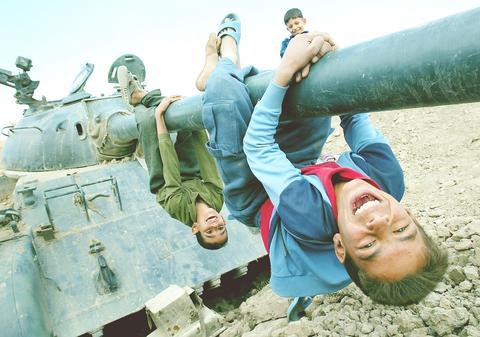As the US pledged to hand power to Iraqis faster, the Pentagon said yesterday that did not mean pulling out troops before they crushed guerrillas who fight on, seven months after the fall of former president Saddam Hussein.
"There is no decision to pull out early. Indeed quite the contrary," Secretary of Defense Donald Rumsfeld said while the US occupying forces launched new "Iron Hammer" strikes on suspected resistance positions around Baghdad.
"We will stay there as long as necessary," he told troops in the Pacific.

PHOTO: REUTERS
He denied Washington and its allies were in trouble after a particularly bloody few weeks in Iraq and insisted they were winning, despite an increasing number of guerrilla attacks.
Arriving in Japan, which is suffering cold feet about sending troops to Iraq after a bomb killed 18 Italians on Wednesday, Rumsfeld met Prime Minister Junichiro Koizumi. He is also due in South Korea, which is reviewing its offer of troops.
Rumsfeld was expected to press Washington's case to its allies for help in stabilizing Iraq to relieve the military and financial burden on the US as President George W. Bush seeks re-election a year from now.
Opinion polls show declining support among American voters for the occupation and growing disillusionment about the way the March invasion has turned out. Bush said on Thursday he wanted to "encourage the Iraqis to assume more responsibility."
US officials have not spelled out how this will be done, saying Iraq administrator Paul Bremer would discuss details with the Iraqi Governing Council on his return to Baghdad after this week's urgent consultations in Washington.
Postwar attacks that have killed 156 US soldiers, along with suicide bombings like Wednesday's assault on an Italian military base, have prompted what US General John Abizaid calls a "sense of urgency" about military efforts in Iraq.
The US military disclosed that Abizaid, leading those efforts, was planning to move back to the Gulf state of Qatar from Central Command headquarters in Florida.
In a fresh guerrilla attack, a roadside blast wounded two American soldiers in southern Baghdad yesterday morning.
Heavy gunfire and explosions had echoed across Baghdad during the night as US forces pursued Operation Iron Hammer against suspected guerrilla targets for a second day.
US forces destroyed a former Republican Guard building they said resistance fighters used to launch attacks and struck more suspected mortar and rocket-launch sites.
A missile fired from a AC-130 Spectre gunship flattened part of the building, leaving a tangle of metal and debris.
"Our unit has been taking fire from this building for several days so that's why we attacked," a US officer on the scene said.

Taiwan is projected to lose a working-age population of about 6.67 million people in two waves of retirement in the coming years, as the nation confronts accelerating demographic decline and a shortage of younger workers to take their place, the Ministry of the Interior said. Taiwan experienced its largest baby boom between 1958 and 1966, when the population grew by 3.78 million, followed by a second surge of 2.89 million between 1976 and 1982, ministry data showed. In 2023, the first of those baby boom generations — those born in the late 1950s and early 1960s — began to enter retirement, triggering

One of two tropical depressions that formed off Taiwan yesterday morning could turn into a moderate typhoon by the weekend, the Central Weather Administration (CWA) said yesterday. Tropical Depression No. 21 formed at 8am about 1,850km off the southeast coast, CWA forecaster Lee Meng-hsuan (李孟軒) said. The weather system is expected to move northwest as it builds momentum, possibly intensifying this weekend into a typhoon, which would be called Mitag, Lee said. The radius of the storm is expected to reach almost 200km, she said. It is forecast to approach the southeast of Taiwan on Monday next week and pass through the Bashi Channel

NO CHANGE: The TRA makes clear that the US does not consider the status of Taiwan to have been determined by WWII-era documents, a former AIT deputy director said The American Institute in Taiwan’s (AIT) comments that World War-II era documents do not determine Taiwan’s political status accurately conveyed the US’ stance, the US Department of State said. An AIT spokesperson on Saturday said that a Chinese official mischaracterized World War II-era documents as stating that Taiwan was ceded to the China. The remarks from the US’ de facto embassy in Taiwan drew criticism from the Ma Ying-jeou Foundation, whose director said the comments put Taiwan in danger. The Chinese-language United Daily News yesterday reported that a US State Department spokesperson confirmed the AIT’s position. They added that the US would continue to

The number of Chinese spouses applying for dependent residency as well as long-term residency in Taiwan has decreased, the Mainland Affairs Council said yesterday, adding that the reduction of Chinese spouses staying or living in Taiwan is only one facet reflecting the general decrease in the number of people willing to get married in Taiwan. The number of Chinese spouses applying for dependent residency last year was 7,123, down by 2,931, or 29.15 percent, from the previous year. The same census showed that the number of Chinese spouses applying for long-term residency and receiving approval last year stood at 2,973, down 1,520,